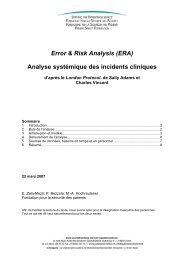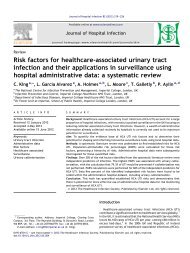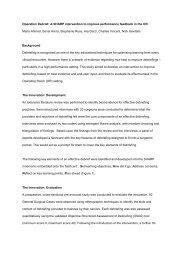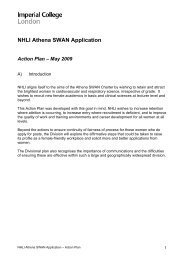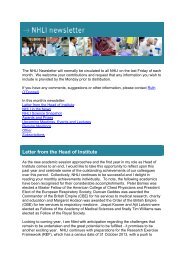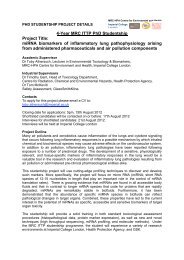MRes Translational Medicine Academic year 2012/2013 Division of ...
MRes Translational Medicine Academic year 2012/2013 Division of ...
MRes Translational Medicine Academic year 2012/2013 Division of ...
You also want an ePaper? Increase the reach of your titles
YUMPU automatically turns print PDFs into web optimized ePapers that Google loves.
<strong>MRes</strong> in Clinical Research (Pathway in <strong>Translational</strong> <strong>Medicine</strong>) - <strong>Academic</strong> Year <strong>2012</strong>-<strong>2013</strong>Guidelines for <strong>MRes</strong> research and final research reports (<strong>MRes</strong> Thesis)General GuidanceAll students will design and undertake a research project which will run for the duration <strong>of</strong> the two<strong>year</strong>programme for part time students or for one <strong>year</strong> for full time students. Your research projectconstitutes a significant proportion (70%) <strong>of</strong> your <strong>MRes</strong> degree, and therefore having a clearunderstanding <strong>of</strong> what is expected is essential. Firstly, you need to be clear about exactly what isinvolved in undertaking a Master’s dissertation and by what criteria it will be judged. Your studyshould make a contribution to the body <strong>of</strong> knowledge in your chosen field, or may replicate existingstudies. However, the time limits on your dissertation are such that, whilst this contribution can beimportant, it will, <strong>of</strong> necessity, be modest but worthwhile. Your dissertation should generallydemonstrate:• Clear aims appropriate to a Master’s level dissertation and to your pr<strong>of</strong>essional situation• High levels <strong>of</strong> autonomy and responsibility in planning and executing research• The ability to present and justify a well structured research question• Extensive knowledge <strong>of</strong> and justification for the appropriate choice <strong>of</strong> methodology• Comprehensive understanding <strong>of</strong> and justification for application <strong>of</strong> the methods relevant tothe chosen methodology• Evaluation and management <strong>of</strong> confounding, bias, chance, and measures <strong>of</strong> association(quantitative study)• Issues <strong>of</strong> truthfulness and reliability (qualitative study)• The ability to analyse critically and interpret the results and findings <strong>of</strong> your study in thecontext <strong>of</strong> existing literature• Critical awareness <strong>of</strong> the limitations <strong>of</strong> the study and the impact <strong>of</strong> these on the results• Appropriate ethical and governance awareness both in planning and execution <strong>of</strong> the study• A depth <strong>of</strong> knowledge in the field <strong>of</strong> study appropriate for Master’s level• Critical evaluation <strong>of</strong> the implications <strong>of</strong> your research for future practice and researchPlanning and organising your workIn the first month students will select a research area after consultation with members <strong>of</strong> the coursemanagement committee. It is anticipated that the majority <strong>of</strong> students will undertake projectswithin their place <strong>of</strong> work, but projects can also be made available for students. Students will berequired to have a clinical supervisor and an Imperial College academic supervisor.<strong>Academic</strong> Supervisor: The academic supervisor will oversee the project, ensure that it is running oncourse in a systematic and academically sound fashion to yield a successful thesis, and provideadditional support as necessary.Clinical Supervisor (particularly relevant for <strong>MRes</strong> CRDM students): The role <strong>of</strong> the clinicalsupervisor is to assist and direct the research on a day-to-day basis. The clinical supervisor will benamed as the Chief Investigator on ethics applications as they will oversee the project and haveknowledge <strong>of</strong> the research area. The responsibility for the ethical aspects <strong>of</strong> the study therefore lieswith them.Although this may vary, it is expected that supervisors will be able to provide up to ten hours <strong>of</strong>supervision and so you should ensure that time spent with your supervisors is carefully planned.31



